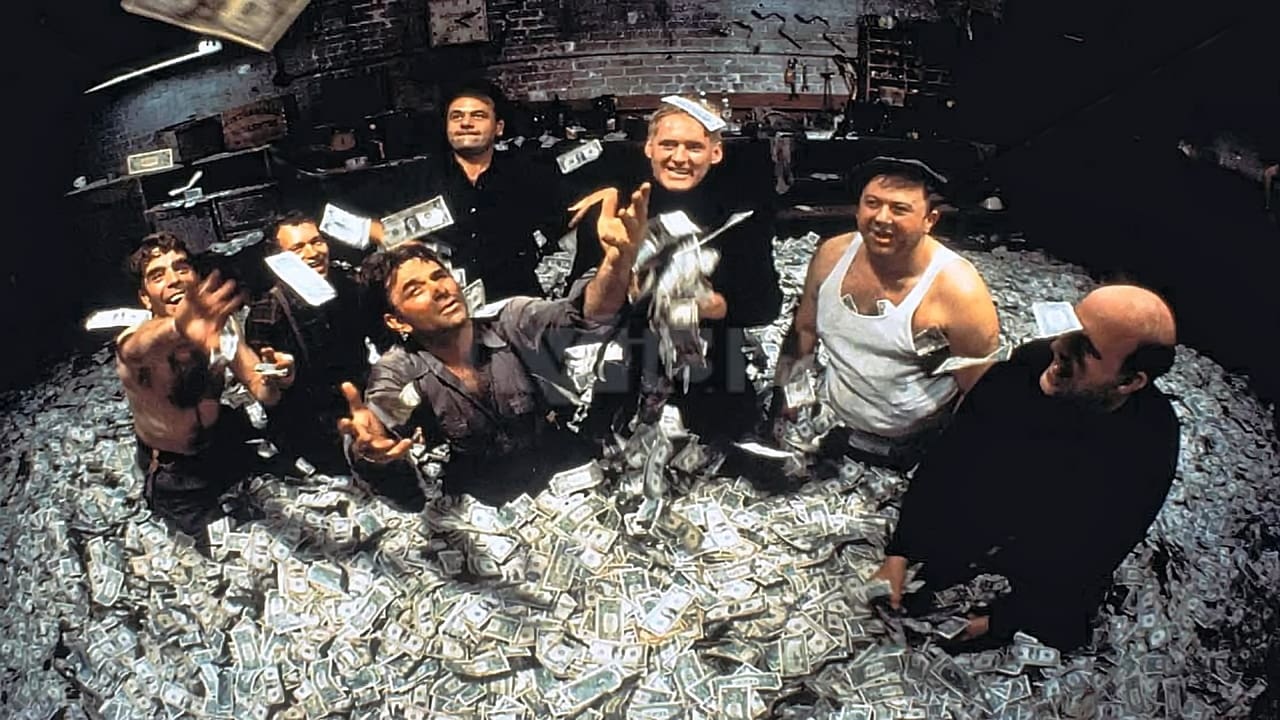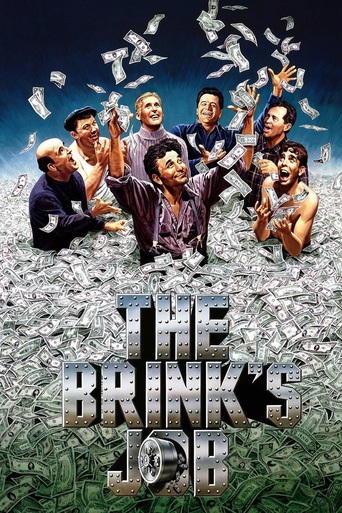

Peter Falk leads a gang of small-time thieves (Peter Boyle, Paul Sorvino, Warren Oates, Allan Garfield, et al) who pull off the biggest robbery of the century, get caught, and go to jail.The director, William Friedkin, and the screenwriter, Walon Green, do a fine and delicate job of balancing the three elements of the story -- comedy, drama, and tension.Mostly it's comic, and the laughs are due not so much to the imposition of obvious gags (though there is some slapstick) as to the ludicrous nature of the thieves themselves and the job they undertake; not an armed robbery but a pasquinade. The amusing lines somehow ring true because the setting is working-class Boston, its brick tenements and skeletal wooden porches and staircases, and its stone streets and old cars and dilapidated clothing and its spent values. "Look at dis coat," brags Falk, as he hands his wife a garment of shabby fur bought with some stolen money. "Dat's genuine muskrat. It says so right on da label. I don't want to tell you what it cost because it's a gift and dat ain't right, but here's da receipt in case somebody asks you where you got it." The drama comes later, after the robbery is successfully pulled off and Peter Boyle is holding the $1.5 million until "the statue runs out." Boyle has already disposed of an easily identified fifty grand by flushing it down the toilet, enraging the others, and now he refuses to divvy up the remainder.The tension is generated during the robbery itself. (Will they get the money? Will someone be killed in the getting of it?) And there is additional tension when Warren Oates and his co-conspirator Kevin O'Connor are arrested and given ten times the usual sentence for minor crimes, the FBI hoping that the pressure and the beatings will cause them to squeal.That's a plot hole. The FBI is involved on a pretext and spends $25 million to solve a $1.5 million robbery because the director, J. Edgar Hoover, is absolutely convinced that the crime represents a link between organized rackets and communist subversives. Okay. That's understood. Hoover was a notorious bonehead and was always grabbing headlines.But hundreds of louche Bostonians are being yanked in for questioning, and nothing involving any of the real gang stands out. Cut to Oates and O'Connor, having a meal in a diner in Tonowanda, Pennsylvania, on their way to Pittsburgh. A couple of state troopers walk through the door and arrest them. Well -- why? Oates is convicted of an infraction involving the carrying of firearms and gets a sentence of 20 years instead of the usual 18 months. The FBI is sitting in the audience, smiling with satisfaction. And O'Connor is given several years for equally small-time infractions and is beaten all to hell to get the story out of him. But how did the FBI -- or anyone else -- know that Oates and O'Connor were involved? And how did they know where to locate the pair during their peregrinations? But, that aside, it's an entertaining story. Friedkin doesn't make the same mistake as Arthur Penn did in "Bonny and Clyde." Nobody is romanticized. One of the robbers has a loving family but that's about as far as it goes. When Falk is leaving for a job, his wife, Gena Rowlands, reminds him to take his screwdriver and gives him a wrapped sandwich, saying, "Take this in case you get hungry later." They don't STAND for anything. They aren't sucked into a life of crime. They're not giving society the finger. It's just something they've chosen for a profession. And despite their occasional clumsiness and pratfalls, they're good at it too. It's "The Asphalt Jungle" but the jungle is Boston and the gang is made up of goofballs.There's something to be learned from it too. Brinks, the most prestigious cash-transport business in the world, was left virtually unguarded. We are continually rediscovering that security is never as tight as it's thought to be, and our infallible organizations are elementally vulnerable. If the Department of Homeland Security sends 100 explosive- and weapon-laden agents through airport check points, about 18% get through. Security is a very serious business and it mystifies most of us with its high technology and the expertise of its technicians, yet, as the sociologist Erving Goffman remarked with regard to primitive rituals, often the real secret behind the mystery is that there is no mystery at all.
... View MoreWords almost fail me in talking about how much I love this film, this very funny, very stylish portrayal of what was considered the robbery of the last century.First of all it could never have been done earlier. J. Edgar Hoover was not a figure to be satirized before May of 1972 when he breathed his last. Sheldon Leonard who plays him here and has him get it all wrong about who pulled the Brink's Armored Car Robbery, would not have taken the role, neither would any other actor. No one wanted to be on that man's bad side. Hoover was not quite the figure you see Leonard play here, though Leonard is fine in the part. Books and films subsequent to his death still really haven't got it quite right about him.For all of J. Edgar's fulminations about the great Communist conspiracy at work in the Brink's job, the whole point of The Brink's Job is who actually did it. Six very ordinary street criminals, none of them violent felons in any way and one fence who declared himself in on the job.The group is headed by Peter Falk who should have been Oscar nominated for his portrayal of Tony Pino, the group's leader and planner. You see The Brink's Job, Peter Falk will remain with you forever. A man without complications and hangups, he's a thief because it's his profession. He does have pride in how good he is though.Some of Falk's best scenes are with his wife Gena Rowlands. She too is a woman who stands by her man. No doubt they came from the same hardscrabble background in Boston's Italian North End and she's completely supportive of him and his work. In particular I love the scene where she's bidding him off to work just like any other wife who's husband had a night job. Don't forget your screwdriver, here's a sandwich in case you get hungry, the scene is priceless.I also love the scene in the restaurant where he takes her after a nice score. Falk is at the height of his considerable talents as he tells Rowlands of his plans for the Brink's Armored Car Company.What everyone will love when they see this film is how comparatively easy it was for these knockabout guys from Boston to accomplish stealing over 4 million dollars. This score was so big, it HAD to be the work of a master criminal mind. The thing is it was, the mind was just not in a body where you would expect it to be found.The others in the mob are Paul Sorvino, Kevin O'Connor, Warren Oates, Gerard Murphy and Peter Boyle who plays the fence. But my favorite in the mob and in the film is Allen Garfield who plays Falk's brother-in-law and sidekick who Falk keeps around for laughs. They have an Abbott&Costello like relationship with everything Garfield touches turning to waste product. My favorite scene in the whole film is when they decide to rob a gum factory payroll. Poor Garfield accidentally presses the wrong switch and he's awash in gumballs. Falk's and Sorvino's differing reactions are priceless.A lot of the film was shot in Boston which in many ways is a city that tries more than most to keep it's traditional look. I haven't been in that city in about five years, but I daresay you could remake The Brink's Job today in the same area.But if you did it wouldn't be as good, that isn't possible.
... View MoreCompared to the hyped up, over violent fare that passes for crime movies, this movie is no contender. But it's a warm, funny, well paced caper flick about some North Boston Italians who stumbled on to the fact that the great Brink's was a paper tiger.
... View MoreA neat little crime caper, and I wonder why we never see it on any of the cable networks. Falk was great, as were Peter Boyle and Warren Oates, and believe or not, Paul Sorvinio was in this one too! Realistic, and pretty honest.
... View More